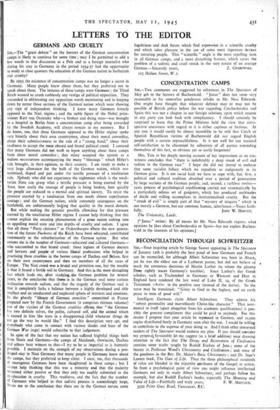CONCENTRATION CAMPS SIR,—Two comments are suggested by references in The
Spectator of May 4th to the horrors of Buchenwald. " Janus " does not seem very reasonable in his somewhat ponderous rebuke to Mr. Ness Edwards. One might have thought that whatever defence may or may not be possible of British policy before the war regarding Czechoslovakia and Spain this was not a chapter in our foreign relations upon which anyone in any party can look back with complacency. I should certainly be surprised to learn that the Prime Minister held the view that retro- spective uneasiness with regard to it is either captious or factious. At any rate it would surely be almost incredible to be told that Czech or Spanish Republican victims of Buchenwald did not regard English people with a certain reproachfulness. Is it not well for our national self-satisfaction to be chasteried by adherents of all parties reminding themselves of this fact, so obvious yet so easily forgotten?
Mrs. Tate in her deeply moving account of her impressions as an eye- witness concludes that " there is indubitably a deep streak of evil and sadism in the German race." I hope she did not intend to endorse that same racialist fallacy which we repudiate so indignantly in its German giiise. It is not racial fault we have to cope with, but, first, a political and cultural tradition absorbed over a period of generations by large sections of the German people, and, second, a ruthless twelve— years process of psychological conditioning carried out systematically by a particularly odious set of gangsters, which has produced multitudes of docile and willing accomplices in institutionalised cruelty. But the " streak of evil" is simply part of that " mystery of iniquity " which is not merely a German, but our common human, inheritance.—Yours faith- fully, JOHN W. HARVEY.
The University, Leeds.
E" Janus" writes: By all means let Mr. Ness Edwards express what opinions he likes about Czechoslovakia or Spain—but not exploit Buchen- wald in the interests of his opinions.]






















 Previous page
Previous page